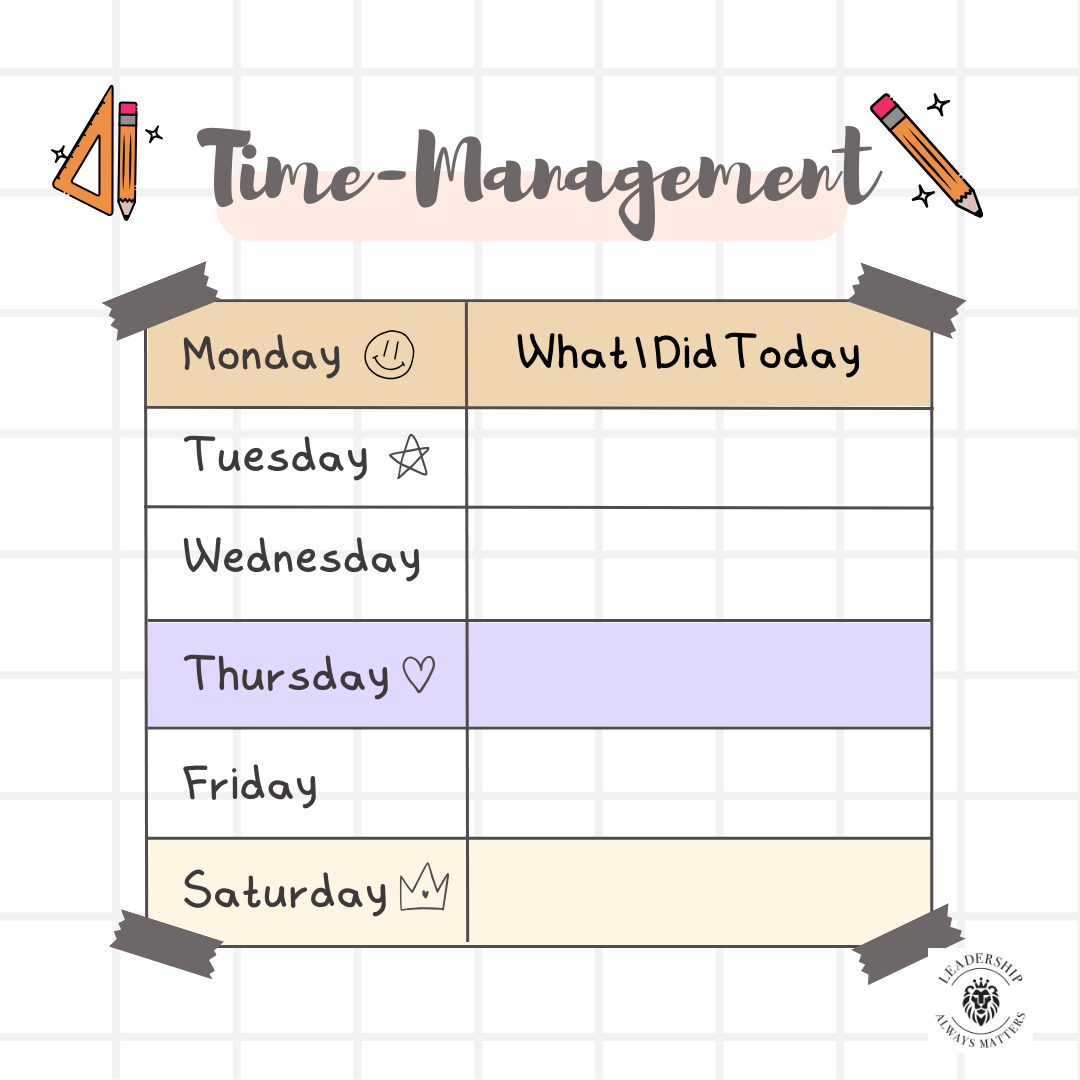Late No More—Why Being on Time Matters
Before we begin…
The beginning of the year is a time of resolution(s). Today’s topic is one that is often overlooked, yet it’s deeply interconnected with effective leadership. It’s a necessary concept if you want to inspire and guide, but just as important— if you want to achieve goals. Simply put—it’s a good way to start the new year!
Let’s Talk Leadership!
Leadership and Time Management are deeply interconnected because as an effective leader, you must manage time wisely. For example when:
Prioritizing
As a strong leader, you focus on high-impact activities that align with your vision. Time management helps you prioritize effectively.
Delegating
When you manage your time well, you understand what tasks should be handled personally and which ones you can delegate. This allows you to empower others— while avoiding burnout.
Good time management allows you to focus your energy on making thoughtful, informed decisions, without being rushed.
Modeling Behavior
When you model effective time management skills, you set the tone, inspire others to do the same, and create a more productive environment.
Managing Crisis
When you manage your time well, you are able to adapt quickly and stay composed during a crisis. It makes it easier to make good use of your resources in the most critical areas.
Do You Know…
that leaders consider “time-management” a core skill to drive results? Because without strong time management skills, there’s inefficiency, stress, and missed opportunities. For you and for those close to you!
People are often surprised to learn that being late is a sign of disrespect for other peoples’ time. It’s a message that reflects a lack of importance. Whether it’s an event, meeting, or celebration.
When I teach high school students, I make sure to include a time-management module about procrastination, planning, and the importance of being on time. It’s hard for them to relate to at first, especially because most of them don’t work.
Yet, it’s precisely the reason of its importance. They learn early on how time management skills impact their personal and professional lives—negatively or positively.
One of the module assignments includes them designing a 1-week calendar with hourly time slots. They are to write down everything they do, during the week and during the weekend.
At the end, they reflect on the questions: “How did I spend my time this week? Was I late to an event? How late? Why was I late?” Too often, students learn they spent too much time sleeping, playing games, or on their phone. Their awakening is when they realize “procrastination” is a monster of time.
“Procrastination doesn’t mean you can’t lead effectively,” I tell them. “It just means you’ll need to be intentional about your habits and how you structure your time.”
The final, thought-provoking question in their reflection is: “What bad habits can I replace this year?” And I use the word “replace” because bad habits don’t just go away—they are replaced with good ones.
It’s a simple assignment that brings different levels of awareness to the use of time.
I Tend to Be Late Most of the Time…How Can I Change That?
If being late is a common issue or if it has become “the norm” for you, then it’s worth addressing it. Because punctuality is about trust and dependability. Two crucial traits of an effective leader.
Here are some ways to help you replace that habit:
Identify the Cause
Do you underestimate time? Do you misjudge how long tasks take? Start timing your regular activities for better accuracy.
Do you overcommit? Are you trying to fit too much into your schedule? Learn to say “no” or space out your commitments.
Do last-minute distractions delay you? Minimize interruptions before leaving.
Work Backward from the Deadline
Set a clear “must leave by” time
Account for commute time, potential delays, and preparation.
Add a 10-15 minute buffer for unexpected situations.
Prep the Night Before
Lay out clothes, pack bags, and prepare anything you’ll need the next day. This eliminates scrambling in the morning.
Set Multiple Alarms
Use alarms as reminders to start getting ready or to leave. For example, set one 15 minutes before you need to go and another at your departure time.
Start Earlier Than Feels Necessary
Aim to arrive 10-15 minutes early instead of “on time.” If you’re naturally late, this mindset helps counteract the tendency.
Cut Down Transition Time
Build in transition time between tasks or appointments. This prevents back-to-back commitments from causing delays.
Practice Self-Reflection
Reflect on how being late impacts your relationships, leadership image, and stress levels (for you and others). Understanding the consequences can motivate change.
Involve Accountability
Ask someone close to you to check in on your punctuality progress. Accountability increases commitment.
Learn What Triggers Procrastination
If you’re a procrastinator, you can still be an effective leader, but you’ll need to find ways to manage your tendencies and still lead effectively.
Is it perfectionism? Fear of failure? Lack of clarity? Identify the root cause and address it directly.
Reward Progress
Celebrate when you’re on time consistently. Positive reinforcement helps replace the habit too.
Why Being on Time Matters
Punctuality is more than just showing up on time—it’s about discipline, respect, and reliability. It’s a skill that takes practice.Think about the situations that make you most likely to be late. Start small—choose one area to focus on (ex.morning meetings), and track your progress.
Punctuality is a great New Year’s resolution because it’s actionable, measurable, and can have a significant impact on your personal and professional life this coming year!
May 2025 be full of blessings for you!
—-Dr. Aguilar



